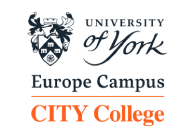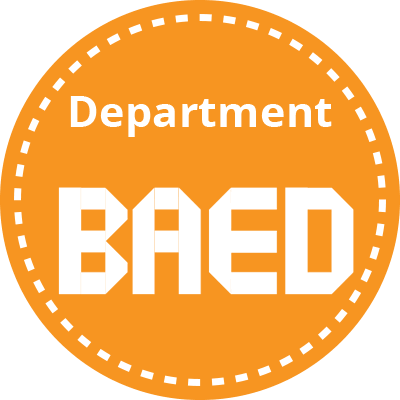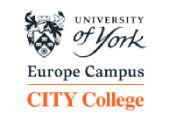Finance and Risk Management - MSc


Degree title: Master of Science in Finance and Risk Management.
The title is awarded directly by the University of York.
Duration: 1 year (full time) or 2 years (part time)
Mode of delivery: Classes take place on weekday evenings
Language of instruction: English
Fees (Scholarships)
We encourage you to take advantage of our Scholarships scheme to save on tuition fees and secure your spot.
For more information, please fill in the form above or call us at (+30) 2310-224026.
The programme
The MSc in Finance and Risk Management is designed for technically-minded graduates who want a deep, analytical study of risk management and finance and who intend to pursue a quantitative career in the financial services sector. The success of organisations depends upon their ability to operate in the face of risk, and risk management is increasingly recognised as requiring special skills central to the functioning of the organisation. The programme will develop a solid theoretical foundation and practical skills in finance and risk management as well as analytical skills in relation to financial institutions and markets, portfolio management, instruments, and other critical areas.
Why choose this course?
-
Degree from one of the world’s top universities, the University of York.
-
High demand for professionals: The finance industry is always in need of skilled professionals who can analyse financial risks and develop strategies to mitigate them.
-
Diverse career opportunities: students are equipped with a diverse set of skills, including financial analysis, risk assessment as well as analytical skills in relation to financial institutions and markets.
-
Solving complex business problems: students are provided with the tools and techniques to solve complex financial problems by analysing and interpreting financial data. This helps organisations to make better-informed financial decisions and improve their performance.
-
Career advancement: an MSc in Finance and Risk Management opens up career opportunities, including senior management positions in financial and risk management organisations,
-
Growth potential: graduates can apply their expertise in financial analysis and risk management to help other businesses mitigate risk, plan investments, and make better financial decisions. They can use their knowledge and skills to start their own businesses.
-
Unique Learning & Teaching Experience: most of the courseworks are practice-based. Students familiarise themselves with relevant softwares. Expert teaching team, comprised of seasoned academics and industry experts with experience. The academic staff is highly qualified and is involved in leading international research in finance and economics. Student-center environment: personal tutoring and support, smooth transition to the UK educational system, supportive classes when needed.
-
Opportunities for potential placements and internships assisting students to embark their career while studying.
-
A pathway to a successful career in Europe and abroad.
More reasons why:
-
Supportive learning environment with a wide range of support services available to students.
-
Free participation in sports and clubs activities.
- Our state of the art library, the Information and Learning Commons (ILC) fully supports our students’ study experience.
- Econometrics for Finance
- Investments and Security Analysis
- Corporate Finance and Valuations
- Financial Reporting and Analysis
- Project and Risk Management
- Financial Engineering
- Financial Derivatives and Risk Management
- Research Methods for Finance
- Dissertation /Research Project
Econometrics for Finance
This unit is highly technical in nature, as it predominantly attempts to expose the quantitative aspects that people in the business and finance profession must be acquainted with should they want to perform everyday tasks effectively. Topics such as decision analysis, inferential statistics, regression and correlation analysis, model specification, econometric problems, time series, and forecasting, provide the platform on which an insightful and vigorous analysis will be conducted. ![]()
Investments and Security Analysis
This unit aims to help students acquire a thorough understanding of the areas of portfolio management and security valuation and analysis. It will provide them with the investment background and recent developments in investment theory, capital markets and asset pricing. Furthermore, it will familiarise them with modern quantitative methods of security and portfolio valuation. Security analysis will focus on fixed income and equity. Important empirical and theoretical evidence will be examined along with practical implementation of tools and methodologies. ![]()
Corporate Finance and Valuations
The unit focuses on the principles of corporate finance such as investing in projects that yield a return greater than the minimum acceptable hurdle rate, choosing a financing mix that minimizes the hurdle rate and matches the assets being financed. Furthermore, it deals with CAPM, capital structure and dividend policy decisions. It also takes a practical approach to valuations of entities. ![]()
Financial Reporting and Analysis
Companies’ financial statements and annual reports are critical instruments in presenting a corporation's financial position, the result of its operations and its cash flows to external and internal users. The main objective of this unit is to give students a critical understanding of financial information; how this information is prepared and; how it can be analysed so as to draw useful conclusions for decision making purposes. The unit examines some of the major aspects of the financial reporting process, its analysis and interpretation. It thereby encourages a critical rather than automatic acceptance of the underlying assumptions behind accounting linking theory with practical examples. ![]()
Project and Risk Management
This module provides an introduction to the theory and practice of risk management and an overview of project management. Risk management is a multidisciplinary field involving economics, mathematics, finance and computer science. Throughout the module, the students will have the opportunity to engage in hands-on exercises, case studies and simulations to apply project management and risk management concepts in practical scenarios. ![]()
Financial Engineering
Financial engineering is an interdisciplinary field which applies quantitative practice and methods to provide solutions in finance. It includes financial engineering, financial mathematics, mathematical engineering, and computational finance. The main objective of the unit is to review the key models and techniques used in practical applications, to understand their applicability and limitations, and to build an integrated framework within the area of financial engineering. ![]()
Financial Derivatives and Risk Management
This unit is based on the analytics of financial derivatives and risk management. Specifically, the unit examines the pricing and use of financial derivatives, including options, forwards, and futures, and swaps, as well as hedging and Value-at-risk in risk management. The course focuses extensively on the analytical aspects of derivative products and the practical applications of risk management tools in various contexts. ![]()
Research Methods for Finance
In the first semester this unit provides essential information on academic presentation, referencing, research and writing skills, different approaches to research and proposal preparation. In the second semester the unit provides students with a sound understanding and the skills needed to apply the methodologies used in quantitative time series analysis.
This is done by familiarising them with the tools that are used in contemporary financial econometrics. At the end of the unit, students are able to critically evaluate the existing literature on the field and to conduct modern research design and execution. The ultimate goal of the unit is to enable students to produce a well thought out dissertation proposal and research project. ![]()
Entry requirements
View the application and admission requirements of the programme.
How to apply
If you wish to apply for this programme you may view details of the application process.
Any questions?
If you'd like to know more about this programme, contact our Admissions Team at
admissions
The Business Administration & Economics Department (BAED) of CITY College, University of York Europe Campus aims at providing all students with an intellectually stimulating and supportive environment that allows them to acquire important skills and competencies for their professional and personal life.
Business matters at BAED. Our undergraduate and postgraduate courses in management related disciplines are designed to challenge students’ thinking and inspire them to develop the advanced knowledge and analytical skills they will need to succeed in business.
Our academics continually work with international, national and regional businesses as part of their research and use their experiences to make their teaching relevant and up-to-date.
More about the Business Administration & Economics Department
Research at the Business Administration & Economics Department
The academic staff of the Business Administration & Economics Department
Contact the Business Administration & Economics Department
Recognition and Careers
Accreditation and Recognition
CITY College is strongly committed to quality education and academic excellence. It is officially accredited and recognised by top international accreditation bodies. Read more
Degree and formal qualifications
The degree and formal qualifications our graduates receive.
For Greek graduates only: Recognition of degrees
Career opportunities
Graduates of the MSc in Finance and Risk Management may pursue careers in risk management, credit risk analysis, insurance, derivatives, banking.
Career, Employability and Enterprise Centre
The Career, Employability and Enterprise Centre, focuses on helping students to set attainable career goals. It offers advice on CVs and cover letters, and on how to effectively handle job interviews. Through career fairs, and different internship programmes, the department aims at constantly bringing students in contact with prospective employers.
Every spring we organize the Annual Career Fair presenting with an opportunity to get a first feel of job seeking. During the event students and alumni have interview opportunities with corporate recruiters and present their skills and abilities to potential employers. Large companies, organisations and multinationals from different industries across S.E. Europe participate every year in our Career Fair and offer employment and internship opportunities to our students and graduates.
More about our Career Services.
Contact the Career, Employability and Enterprise Centre at careers
The programme is taught by academic staff members who have extensive teaching and professional experience. Our academics continually work with international, national and regional businesses as part of their research and use their experiences to make their teaching relevant and up-to-date. The administration staff fully supports all processes of the department and provides a wide range of services to our students.

“Business Administration and Economics Department Staff are committed to a shared vision: to inspire people within the academic and the wider community. Our responsibility is to engage students to develop their knowledge and their skills in order to stand out for their integrity and ethos. Our main goal is to transfer our international experience, outstanding teaching, excellent research and real business networking to our students.”
Ms Aggeliki Papakonstantinou
Head of the Business Administration & Economics Department
The academic staff & administration staff of the Business Administration & Economics Department












